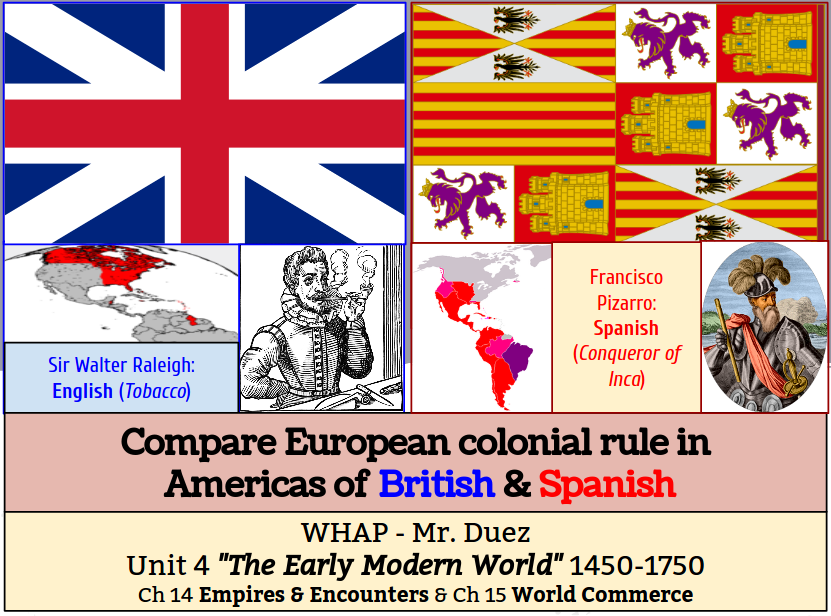Advanced Placement World History with Mr. Duez
Unit 5: The European Moment, 1750 - 1914
CH 17: The Atlantic Revolutions -and- CH 18: The Industrial Revolution
Week at a Glance:MON: Quiz Ch 18; Review 18 Quiz
TUE: The Art of the Atlantic Revolutions; Revolutions of Industry - Introduction
WED/THU: Document Based Question Skills - POV, Historical Context; Analysis
FRI: TEST Unit 5, Part I: CH 17 & 18 -- Atlantic Revolutions & Revolutions of Industry -AND- DBQ Skills - POV
Test Wed/Thu Unit 5: Part I, CH 17 & 18, Plus DBQ Skills - POV
No Quiz next week (no school on Monday)
DBQ Flip on Wed/Thu Feb. 22nd & 23rd
#1: 2010 Industrial Revolution in Japan & India DBQ
2010 DBQ Student Samples
#2: African Scramble-Berlin Conference
2009 DBQ Student samples
 |
| Why did the Industrial Revolution take hold and seem to explode in Great Britain? |
Quote: "Change is the law of life. And those who look only to the past or present are certain to miss the future." - John F. Kennedy
Learning Targets:
• To explore the causes and consequences of the Industrial Revolution
• To root Europe’s Industrial Revolution in a global context
• To examine the question of why industrialization first “took off ” in Great Britain
• To heighten student awareness of both the positive and the negative effects of the Industrial Revolution
• To examine some of the ways in which nineteenth-century industrial powers exerted an economic imperialism over their non-industrialized neighbors
Essential Questions:
1. What was revolutionary about the Industrial Revolution?
2. What was common to the process of industrialization everywhere, and in what ways did that process vary from place to place?
3. What did humankind gain from the Industrial Revolution, and what did it lose?
4. In what ways might the Industrial Revolution be understood as a global rather than simply a European phenomenon?
Agenda:
1. Quiz Chapter 18 The Industrial Revolution
2. Review CH 18 Quiz

 |
| The Russian Revolution definitely qualifies as "Revolution of Industry". |
Quote: "Change does not roll in on the wheels of inevitability, but comes through continuous struggle. And so we must straighten our backs and work for our freedom. A man can't ride you unless your back is bent." - Martin Luther King, Jr.
Learning Targets:
• To explore the causes and consequences of the Industrial Revolution
• To root Europe’s Industrial Revolution in a global context
• To examine the question of why industrialization first “took off ” in Great Britain
• To heighten student awareness of both the positive and the negative effects of the Industrial Revolution
• To examine some of the ways in which nineteenth-century industrial powers exerted an economic imperialism over their non-industrialized neighbors
Essential Questions:
1. What was revolutionary about the Industrial Revolution?
2. What was common to the process of industrialization everywhere, and in what ways did that process vary from place to place?
3. What did humankind gain from the Industrial Revolution, and what did it lose?
4. In what ways might the Industrial Revolution be understood as a global rather than simply a European phenomenon?
Agenda:
1. DO NOW: Artwork helped to spread the ideas of Revolution and was used as propoganda by Revolutionaries. Should artists be held responsible for the death that may result from their work?
2. Notes, Video, Discussion: The Art of the Atlantic Revolutions
3. Introduction: Revolutions of Industry
Why did the Industrial Revolution happen first in Great Britain?
-------------------------------------------------
Wednesday, February 10th & Thursday, February 11th, 2016
Quote: "To improve is to change; to be perfect is to change often." - Winston Churchill
Agenda:
1. DO NOW: Review the document on the screen, write out the meaning & point of view.
2. Notes, Video, Discussion: Revolutions of Industry
3. SAQ From last test: Check samples from class. Grade examples of student work.
4. Discuss DQB Point of View: Review the rubric, tips and tricks & the two prompts we'll flip on for the next DBQ on Feb. 22nd and Feb. 23rd.
DBQ Skill Practice
Practice DBQs:
Link to DBQ for Industrial Revolution
Link to DBQ for Atlantic Revolutions
 |
| The Industrial Revolution made life better, but progress came with a cost. |
Friday, February 12th, 2016
Quote: "I have noticed even people who claim everything is predestined, and that we can do nothing to change it, look before they cross the road." - Stephen Hawking
Agenda:
1. TEST - Multiple Choice 35 questions + 1 Short Answer Question (SAQ)
You will have the period for the test.


































.jpg)



